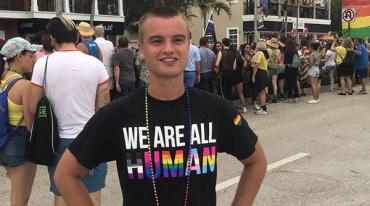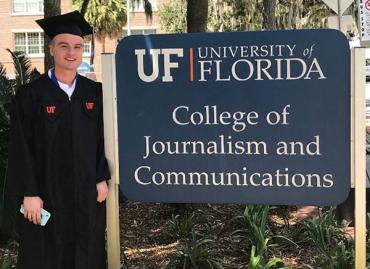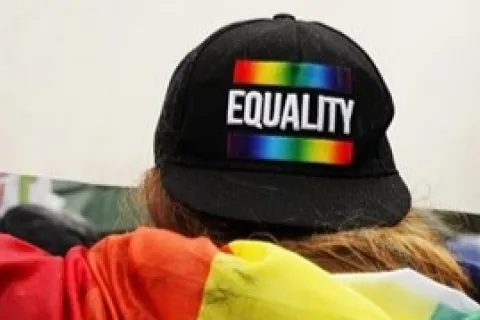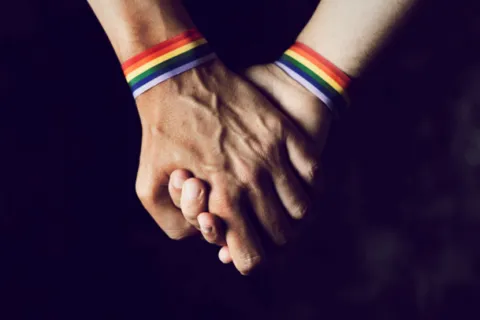Video: Meet Bryan B.
Bryan B., 24
Opening up about the hardships I’ve endured in my life has been a challenge, but I know by speaking out, I can help countless others, and that’s what matters most.
As a 24-year-old autistic man who is also part of the LGBTQ community, I want to take this opportunity to share my story with Autism Speaks. If my words can inspire just one person or provide a perspective to someone searching for answers during difficult times, it’ll all be worth it.
It makes me think back on an exercise one of my professors had us do during the first year of my Master’s program at Florida Atlantic University. She asked us to think about a time when we had been made fun of or shunned for being different. We were given a piece of paper and asked to write three words to explain how those times made us feel. I chose to talk about the many times I was bullied in middle school. Even though it was painful to relive those memories and there was a sense of vulnerability, I felt so liberated when I was finished - like a weight was lifted off of me once that piece of paper was ripped up into tiny fragments.
Growing up on the spectrum
I went to a handful of speech therapists, occupational therapists and different schools before kindergarten. Additionally, there was one ESE teacher, Sue, who became my most influential educator and a close family friend. Without her and the caring staff members and specialists I’ve had throughout my life, I would never come this far.
My parents and my sister sacrificed a lot for me. Without their support during every step of my journey, I would not have been able to achieve any of the things I have up to this point in my life. While all my friends were having playdates, I was seeing specialists. As a result, my childhood was far from “normal.” The person who related to me most during this time was my sister. She was always there for me, even as a child in elementary school. She was at my speech and occupational therapy appointments every day – making sure I was supported. This is what helped me grow a lot closer to my sister as I got older and also helped me to better understand my autism. I also think watching me go through what I did, to some extent, inspired her to become a teacher and pursue a career in special education.
Until fifth grade, my classes were selected around my needs, and I had good grades. Things changed for me in middle school because that’s where I started to be bullied for being different. I still did well academically, but I was constantly made to feel like I was an outcast. I heard slurs and insults, and at times, the bullying became physical. There was one incident at lunch in the cafeteria where kids from my class and other classes started tormenting me to the point where I started crying underneath the table. It was a time in my life that I’ll never forget, because I overcame to become the strong, confident person I am today.
My age of enlightenment
In high school, I kept good grades and made straight A’s just about every quarter. I also joined the cross-country team and school newspaper. By my senior year, I became assistant captain of the team and won a scholarship. For the newspaper, I wrote a profile on a transgender student, and a news piece about safe sex in sex education, among many other topics. As far as building a social life, I had a core group of friends, but I was able to get along with a lot of people. I had become much more charismatic by this time, too, so things seemed to get easier as I learned more about myself.
In 2014, I graduated salutatorian of my high school class of 650 people. I got to give a speech at graduation. In the speech, I brought up my struggles and triumphs with autism and being LGBTQ, how I had to work harder than most of my classmates just to have this opportunity. I wanted to give a speech for the underdog – one that a younger version of myself and my parents could relate to and feel inspired by. At the end, I got a standing ovation, which for my high school, was rare.
Still learning and growing
At University of Florida, learning to live independently and adjusting to life away from home were two big challenges. Establishing a routine helped as I laid out my schedule each week depending on my class and exam schedules, setting time aside for eating, studying, running/working out, and going out. I would always allow for some flexibility, because college life can be unpredictable. Making friends in your classes helps too! For those who are on the spectrum, reaching out to a disability resource center can help immensely. Don’t be afraid to try new things.
Learn more about my life as a bisexual man on the spectrum in this Q&A:
At what age were you diagnosed with autism?
I was diagnosed with autism when I was two years old.
When did you realize what it meant to be on the spectrum?
Even though I was diagnosed with autism at two, my parents did not tell me until I was 14. I learned that autism is a spectrum, and each person on the spectrum is unique. When I learned this, I was able to view myself with a sense of pride.
Can you draw similarities between the struggles you had to face when coming out to family, friends and peers about your autism and your sexuality?
Social isolation and fear of not being accepted are major themes. Revealing I have autism was easy. People do not target you in the same way. With being LGBTQ, I originally tried to “undo” my coming out after graduation because I feared not being accepted at UF. There were a few queerphobic incidents my freshman year, but I accepted myself again by senior year, as did my friends.
Nobody wants to be shunned, but being on the spectrum or being LGBTQ are, to a lot of people, bad. We all deserve to belong. While there are a lot of parallels, it is important to note that the experiences being LGBTQ versus autistic do have important differences, especially as it relates to the societal levels, attitudes and history regarding autism and nonheterosexuality acceptance.
What advice would you give to a young person, recently diagnosed with autism, wondering what the future holds for them?
Do not give up. Reach out to the available resources. There is nothing wrong with you. You can do anything you put your mind too. All you have to do is believe in yourself and work hard. No matter what happens or what negative influences come, stay strong. When you’re going to work or school, know your rights as a person with a disability, and don’t be afraid to stand up for yourself. To the families and siblings, you need to support and encourage your family member every step of the way. With this support, you will give your family member the confidence they need to fulfill their dreams.
What advice would you give to someone struggling with their sexual identity and the decision to come out?
I recommend reaching out to various sources. It can be an organization, a teacher or anyone you trust. My advice on coming out would be to do it on your own terms. Once you can accept yourself, everything else will fall into place. Your real friends will accept you for who you are. Your parents and siblings might have questions, be unsure, or not be accepting. Sometimes, acceptance can take time for them, so please remember there are community leaders and groups who will listen and be there to provide support.
What are some of the biggest life lessons you’ve learned up to this point in your life?
I’ve learned that you can’t please everybody. Life is not about changing yourself for others. There will be people who will try to knock you off of your path, but no matter how hard things get, you must stay strong to rise above. There are people along the way who won’t understand you or care about how you feel – they might even try to belittle you. Do not be afraid to stand up for yourself. Your confidence will take you far.
What are some of your proudest moments?
Graduating as salutatorian was big. In 2018, I graduated UF with a degree in journalism. Also, hosting my own top-40 radio show time slot on the campus radio station was big. The energy, knowledge and passion I brought made for a good show. I was on air, usually with another co-host, and we communicated all the latest information in pop-culture news. If you ever needed somebody to live-tweet an award show for the station, I was your guy.
As a multimedia weather forecaster for a campus TV station, I did live broadcasts and tapings and used social media heavily. The work I did on a normal day or when severe weather threatened was valuable to the station. I’m most proud of working through Hurricane Irma. The weather station is one part of UF’s weather operation. Another part runs a statewide communication network and a mobile app.
After graduation, I was awarded for excellence in forecasting/meteorology. I want to take a moment to thank all of my mentors at the weather and radio stations who helped me excel. And to everybody else at UF’s media properties and College of Journalism and Communications who helped me in any way throughout my journey.
What are your some of your goals for the future?
I want to graduate with my master’s degree and begin working either as a writer, reporter or somebody in emergency management. With my background in weather and communications, I believe I could have a future in emergency management, hopefully for Broward County or the state of Florida. I could, however, see myself on TV in some capacity one day.
Besides my career, I want to be able to do more advocacy for the LGBTQ and autism communities.
When you see Pride Month being celebrated all over the country and around the world, how does that make you feel?
Seeing Pride Month become a national and international celebration makes me proud of the progress made. But it also makes me aware that Pride is a call to action to keep the fight for equality going. Equality is not present in every place in the country or world. It takes more than laws to change people. In the LGBTQ community, there is underrepresentation for people with disabilities, people of color, people of faith, and transgender people. Pride is a call to action to ensure all people are heard.
What five words best describe Bryan?
Motivated, outspoken, energetic, intelligent, eclectic.









